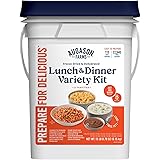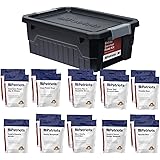Prepping can seem a bit daunting, especially when you’re a senior citizen. But I believe that with the right approach, we can all get ready for whatever life throws at us. Over the years, I’ve learned a thing or two about ensuring I have what I need, and trust me, it’s not as hard as it sounds. Here, I’m breaking it down into five key areas that can help you get started if you’re feeling a little lost.
Understanding Your Needs
Assessing What You Use Daily
I’ve found that the first step to prepping is really just understanding what you need on a daily basis. Take a moment to jot down everything you use regularly—medications, food, even personal care items. This simple list can help clarify what you genuinely cannot do without.
Next, think about your lifestyle. Are you home most of the time? Do you go out often? This will influence your prepping strategy. A senior with mobility issues might want to focus on easy-access items, while those with a more active lifestyle may need to widen their scope.
Finally, remember that our needs can change. I recommend revisiting your list every few months to make sure you’re staying on track. You’ll get a feel for what’s essential, and it’ll alleviate some of that anxiety about being caught off guard.
Building a Basic Emergency Kit
Gathering Essentials
Creating an emergency kit is like packing a safety net. Start with the basics: water, non-perishable food, batteries, and a flashlight. I keep my kit in an easily accessible spot so I can quickly grab it when needed. Think of this as your go-bag for unexpected moments!
Then, consider adding any personal items that might be a bit more specific to your needs. For instance, do you have a pet? Make sure to include pet food and supplies. Also, don’t forget about documents—having copies of your important paperwork can be a lifesaver.
Additionally, include a first-aid kit. Trust me, having some band-aids and antiseptic on hand can ease a lot of worries if you get a minor scrape or need to address a sudden health issue.
Developing a Support Network
Connecting with Family and Friends
One tip I can’t stress enough is the importance of a solid support network. Reach out to your loved ones—friends, family, even neighbors. You don’t have to do all this prepping alone! Having a solid group means you can share ideas, resources, and skills.
== > What if ... Get a FREE Subscription to PREPARE
Consider organizing a small get-together where everyone can discuss their prepping ideas. I’ve found that turning it into a potluck can make the whole experience more enjoyable and collaborative.
Plus, a network ensures you’ve got someone to rely on should the unexpected happen. It’s comforting to know that if something goes wrong, there are others who can lend a hand!
Staying Informed and Prepared
Keeping Up with News and Resources
Knowledge is power! Make it a routine to stay informed about what’s happening in your local area and beyond. I like to check the news every morning over breakfast; it keeps me grounded in what’s going on.
Get Preparedness and Self-Reliance Tips. Subscribe Now!
But it’s not just news! There are loads of resources out there for seniors about prepping—through your local community center, senior organizations, or even online. Signing up for newsletters or alerts can keep that information flowing.
Lastly, consider attending workshops or classes. I’ve found that learning alongside others can really reinforce what I’ve learned and helps boost my confidence in my prepping skills.
Practicing Your Plan
Simulating Emergency Scenarios
Once you have your kit and your plans set, it’s time to practice! I like to run through different scenarios—what if there’s no power? How would I cook? Or what if I had to evacuate? Practicing can reveal any gaps in your planning.
Get familiar with your emergency kit during these drills. Go through it once a month, and be sure to replace any expired items. This not only keeps you prepared but also builds your confidence over time.
And don’t forget to keep your pets in mind! Incorporate them into your drills. They’re part of the family, after all. By keeping these practice sessions lighthearted, you can help ease any anxiety that comes with preparing for emergencies.
Frequently Asked Questions
1. What are the essential items I should include in my emergency kit?
Your emergency kit should include water, non-perishable food, a flashlight, batteries, a first-aid kit, and any personal items like medications. Don’t forget documents and items for pets if applicable!
2. How often should I update my emergency kit?
I recommend reviewing and updating your emergency kit every few months. Check for any expired items or things you no longer need.
3. Why is having a support network important for preppers?
A support network can offer assistance, resources, and companionship on your prepping journey. It makes the process feel less isolating and more collaborative.
4. How can I stay informed about safety resources for seniors?
Make it a habit to check the news and follow local organizations dedicated to seniors. Subscribing to newsletters can also be very helpful.
5. Should I practice emergency drills alone?
It’s beneficial to practice drills with friends or family, but you can also do them alone. The more familiar you become with your plan, the more confident you’ll feel in an actual emergency.
Get Preparedness and Self-Reliance Tips. Subscribe Now!
Related Content
Lunch & Dinner Variety Kit Emergency Food Supply, 113 Servings, 25 Year Shelf Life - Dehydrated Meals, Survival Food Camping Essentials, 4 Gallon Bucket
$79.05 (as of March 3, 2026 12:14 GMT -05:00 - More infoProduct prices and availability are accurate as of the date/time indicated and are subject to change. Any price and availability information displayed on [relevant Amazon Site(s), as applicable] at the time of purchase will apply to the purchase of this product.)2026 Inspection U.S. Military Surplus MREs A and B Case – 2 Cases of 12 each Meals ready Eat | Genuine Military Rations with Flameless Heaters | Long Shelf-Life Emergency Food Supply
$93.95 (as of March 3, 2026 12:14 GMT -05:00 - More infoProduct prices and availability are accurate as of the date/time indicated and are subject to change. Any price and availability information displayed on [relevant Amazon Site(s), as applicable] at the time of purchase will apply to the purchase of this product.)4Patriots Emergency Entree Food Kit – 128 Tasty Freeze-Dried MRE Survival Meals, 25 Year Shelf Life
$125.95 (as of March 3, 2026 12:14 GMT -05:00 - More infoProduct prices and availability are accurate as of the date/time indicated and are subject to change. Any price and availability information displayed on [relevant Amazon Site(s), as applicable] at the time of purchase will apply to the purchase of this product.)Genuine USGI Individual MRE [Meal, Ready to Eat] Inspection Date 01/2024 or Newer - You Choose Menu - Complete Ration with Entree, Snacks, Dessert, Drink Mix, Utensils, Condiments and FRH. (#19 Jalapeno Beef Patty)
$13.99 (as of March 3, 2026 12:14 GMT -05:00 - More infoProduct prices and availability are accurate as of the date/time indicated and are subject to change. Any price and availability information displayed on [relevant Amazon Site(s), as applicable] at the time of purchase will apply to the purchase of this product.)Grizzly Gear Emergency Food Rations- 3600 Calorie Blueberry Bar - 3 Day, 72 Hour Supply For Disaster, Hurricane, Flood Preparedness - Less Sugar, More Nutrients Than Leading Brands - 5 Year Shelf Life
Now retrieving the price.
(as of March 3, 2026 12:14 GMT -05:00 - More infoProduct prices and availability are accurate as of the date/time indicated and are subject to change. Any price and availability information displayed on [relevant Amazon Site(s), as applicable] at the time of purchase will apply to the purchase of this product.)





